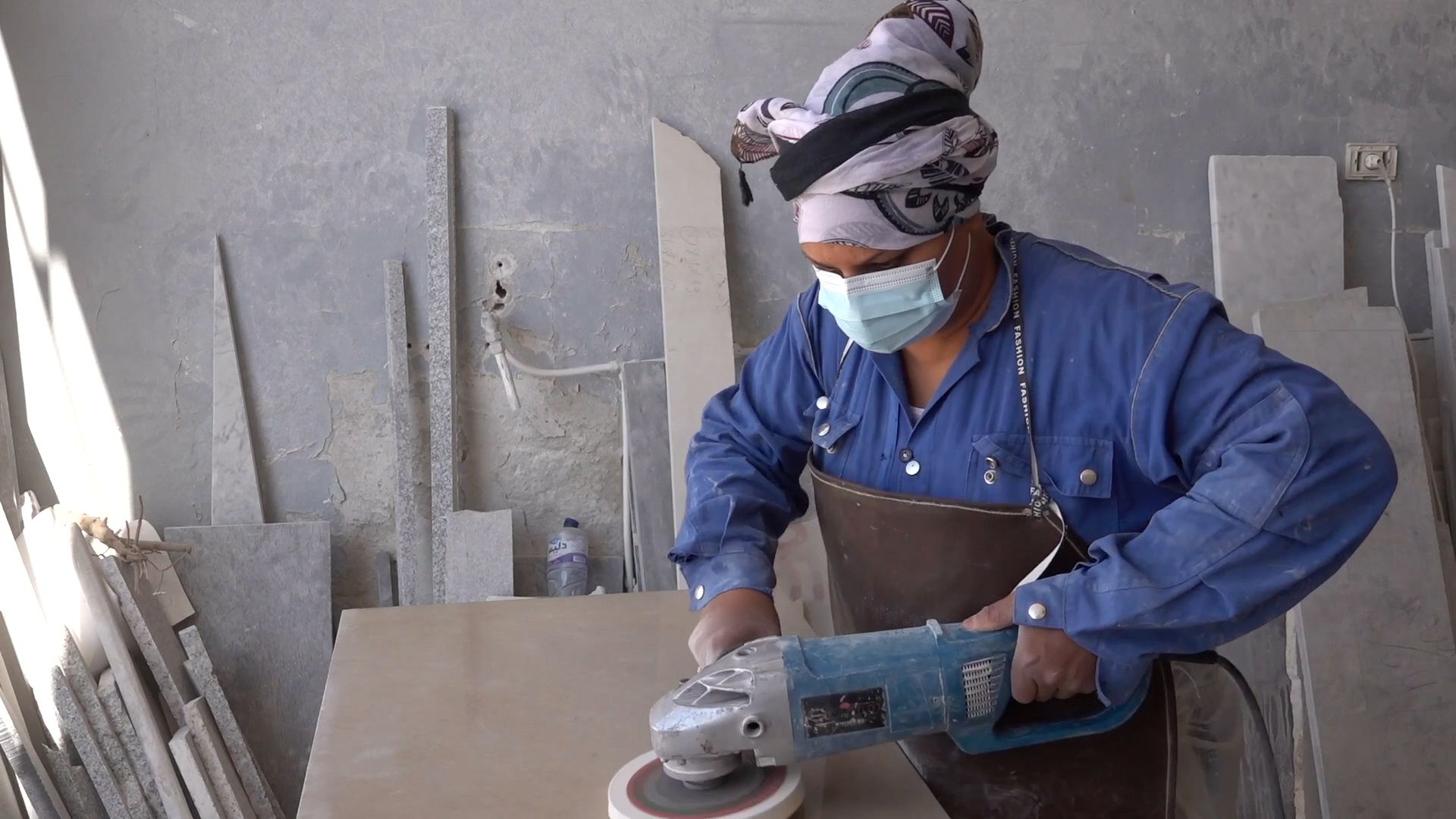play videoplay video
Video duration 03 minutes 32 seconds 03:32
Fawzia Al-Daghari's features disappear beneath a layer of marble dust emerging from under the fire of a machine for cutting and polishing this solid material, in her workshop in a neighborhood in the city of Medenine, southeastern Tunisia.
As soon as you approach her, the features of a serious, strict woman appear because she has marble, which she cut into different shapes to cover kitchens, stairs, and floors in homes and courtyards.
Fawzia went through a story of challenge and made her way through difficulties to prove herself (Anatolia)
Regarding her story with marble, Fawzia (50 years old) says, “The whole story is love. When we fall in love with something, and you are told that you are a woman and you cannot do it, the story of defiance and paving the way through difficulties to prove oneself begins.”
Fawzia adds, "I used to memorize the profession by eye, and what I wasn't doing I started doing, in a kind of challenge."
Regarding the reason for working in a profession that seems masculine, she explains, “I had the opportunity to get closer to the marble industry because it was my husband’s job, so I loved this project.”
Fawzia Al-Daghari's features disappear beneath a layer of marble dust emanating from under the fire of the marble cutting and polishing machine (Anatolia)
Difficulties and accidents
The profession of marble polishing is not without difficulties, as Fawzia says, “It is difficult work, and I was exposed to two accidents during my work. One time a truck overturned on me, and another time a marble slab fell on me. This work is usually reserved for men, because it requires a strong structure and a strong personality.”
In confident tones of voice, she adds, “I am proud of myself because I changed the mentality that prevailed when I entered the field in 1998. In the beginning, when I entered a building or facility, my companions would be told, ‘I brought a woman to take measurements.. She does not know, and we do not accept her!’”
“But the artistic touch that women give to work through decorations and other things has become acceptable, and people require Fawzia to work... and now I design any work in three dimensions,” Fawzia continues, proudly.
Fawzia continues her work in her workshop in the city of Medenine, southeastern Tunisia (Anatolia)
Double action
According to Fawzia, who supports her family, “Some people think that women only work at home, but they do not know that work at home is very hard... There is arranging the house, raising children, and at the same time working in the workshop is difficult work, but I wanted to impose myself.”
She added, "My father - may God have mercy on him - used to say to me, 'Daughter, do not engage in a job that you do not master. I must be skilled, and when I take a marble slab I must adjust my measurements, so that no excess remains are thrown into the rubbish pile.'"
Fawzia: The artistic touches of my work and listening to the desires of customers always make them return to me (Anatolia)
Fawzia spent 25 years working in marble polishing, not all of which were years of abundant profit, as “I was exposed to several disappointments during the revolution period (which began in December 2010) and I sold part of my work tools,” she says.
She added with regret, "My workshop was large, but as a result of the pressure of financial conditions without support and the recession of the market, I was forced to work in a mill for grains and spices to get out of the economic crisis in which I fell."
As for the secret of her excellence in working with marble, she explains that “the artistic touches in my work are the result of fine women’s taste who have the keenness to listen to the diverse desires of customers, which makes them always return to me.”
Fawzia: I am proud of myself because I changed the mentality that prevailed when I entered the field in 1998 (Anatolia)
Diverse skills
Fawzia is not only good at bending marble. As she says, she is always learning, “When I find a spare time, I practice to learn other crafts. I trained in distilling oils, making soap, fiber optics, disinfectants, and canning.”
She continues, "I obtained certificates proving my competence, studied remotely via the Internet, and obtained certificates in dealing with the elderly and children with special needs."
She explains her continuous and diverse learning as “ambition and anticipation of the difficulties that may encounter certain crafts, so a person works in crafts that are popular in the market.”
Fawzia was honored and praised for her level of work in France in the field of marble (Anatolia)
Fawzia was honored and praised for the level of her work. She said, “I was honored in France in the field of marble. They work with lasers and water pressure, but they appreciated my work, which is done using simple means.”
With a quarter of a century of work and facing market fluctuations, Fawzia sends a message to young people who aspire to immigrate, saying, “Strive with Tunisia, there (outside Tunisia) you will not find your father and mother. You were born in this country, so if you and I immigrate, who will rebuild the country? (…) We have to struggle and work more,” she concluded her speech.
Source: Anadolu Agency

